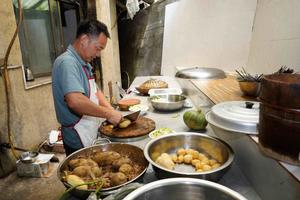The sector has been given the green light to resume domestic tours. Wang Keju reports.
 Tourists disembark a cruise ship to visit Mount Putuo in Zhoushan, Zhejiang province, after the site partially reopened earlier this year. (ZOU XUNYONG / FOR CHINA DAILY)
Tourists disembark a cruise ship to visit Mount Putuo in Zhoushan, Zhejiang province, after the site partially reopened earlier this year. (ZOU XUNYONG / FOR CHINA DAILY)
Wearing a long, steel-gray gown and holding a string of Buddha beads, Dai Shuai welcomed his record-breaking 6,000-strong "tourist group" to Mount Putuo-one of China's four sacred Buddhist mountains.
Prior to the novel coronavirus outbreak, the 30-year-old guide would think himself lucky if some 60 people signed up for each sightseeing tour.
This time, though, all the "visitors" to this serene land of Buddhism, located on a small island just off the coast of Zhejiang province, came via their smartphones.
The "tour" was held in mid-March, as the grip of the virus began to ease nationwide.
"Hello, everyone: Welcome to this virtual walk around this gorgeous mountain and our intriguing temple tour of historical and religious relics. Hiking through this sacred land, you will have an extraordinary experience of a spiritual sanctuary," Dai said, greeting the audience from behind a face mask.
He then toiled up the steep and narrow way, sometimes zooming in to a freeze frame to give the viewers a clear look at the meadows shaded with aspen and willow trees that bordered a stream, or elaborated on the unique culture illustrated by sculptures, stone carvings and architecture.
During the nearly two-hour online tour, some audience members tipped him with virtual gifts as a mark of appreciation for his introduction. It was the only source of income Dai had in the first quarter of the year after the outbreak pushed the pause button on the entire offline tourism industry.
"Though the tips of 2,000 yuan (US$289) only amounted to one-fifth of my regular monthly salary, at least the money offset my basic expenses," he said, adding that livestreaming offered a glimmer of hope amid the gloomy tourism market.
 Visitors watch children play musical instruments in the courtyard of a homestay in Wulong, Chongqing, on Aug 2. (LIU CHAN / XINHUA)
Visitors watch children play musical instruments in the courtyard of a homestay in Wulong, Chongqing, on Aug 2. (LIU CHAN / XINHUA)
A hard fall
Few sectors fell as far and as fast as tourism as a result of the epidemic, and a large section of the industry was brought to its knees in the first three months-the height of the outbreak-as most of the nation's scenic spots and historic sites were closed to prevent the spread of the virus.
However, instead of simply waiting for the problem to pass, many of those who faced the prospect of months without work were racking their brains and leveraging all resources to weather the storm.
According to the Ministry of Culture and Tourism, the sector provided jobs for 79.87 million people, directly and indirectly, last year, accounting for over 10 percent of China's employed population.
"Not knowing when the tourists or our jobs would come back, the lack of work saw quite a few tour guides become unemployed because travel agencies had no orders and could not afford to pay them a penny," Dai said. "But life had to go on. We had no choice but to find a way to survive."
During the first few weeks, he chose to coop himself up at home. He had his nose in books about the history and culture of Mount Putuo, as well as Buddhism and meditation, for at least 10 hours a day as he worked to deepen his knowledge as a tour guide.
After lunch, he often strolled round the mountain, taking photos and videos and posting them on the videosharing platform Douyin. In the posts, he related anecdotes about the scenic spot and relayed the latest information about its possible reopening.
Dai's efforts paid off. In March, the Mount Putuo management committee saw some of his video clips on Douyin and offered him the opportunity to launch online tours of the area via livestreams.
In the following two months, Dai livestreamed tours of the mountain and temples three times a week for about two hours each time. He gradually garnered lots of traffic and attention and attracted over 450,000 followers to his social media account.
"With an average 2,000 people viewing each of my online tours-and over 6,000 during peak times-I occasionally received tips from the audience," he said. "Thanks to those windfalls, I was able to get by for a few months and find the confidence to continue my career."
In late April, when the epidemic had basically been subdued nationwide, domestic travel demand was on an upswing after more than two months of inactivity. Thanks to the reputation he had established via the livestreams, Dai was one of the first guides to receive orders from local tour groups, and his life gradually began to get back on the right path.
 A homestay host prepares lunch for tourists in Wulong on July 31. (LIU CHAN / XINHUA)
A homestay host prepares lunch for tourists in Wulong on July 31. (LIU CHAN / XINHUA)
Outbound struggles
However, people who make a living through outbound tourism have had to make even greater efforts to stay in the game after a dominant narrative emerged about the inexorable downward slide of the sector, given that the pandemic is still wreaking havoc in many countries.
For them, the worst part is the uncertainty about when a ban on overseas travel, imposed by the ministry, will be lifted.
Last year, 155 million Chinese headed overseas, a rise of 3.3 percent from 2018, according to a report released by the China Tourism Academy in March. In this sense, a single day of inactivity could lead to the loss of about 425,000 outbound tourists.
For the past six months, Lei Lei, product manager at a branch of China CYTS Tours in Beijing that organizes outbound trips, has been at a loose end.
"Domestic tours were able to resume once the virus had been brought under control. As for outbound travel, it's all down to the epidemic situations in other countries," she said, adding that she is sure outbound tourism will be the last on the resumption list as authorities look to protect people's safety.
Since there is no way the company can restore business anytime soon, it has turned to a long-term bailout plan.
It is offering free online courses about famous historical relics, topnotch museums and niche tourist attractions-such as Palma Cathedral in Mallorca, Spain, and a skiing resort in Georgia-to attract customers and maintain a relationship with them.
The company has also invited well-known history and art experts to provide in-depth, interesting stories behind relics and artworks.
The courses-in which one of the experts livestreams for 30 minutes a day-are available to everyone who joins the company's WeChat groups.
While the courses are no substitute for the experience of visiting museums and galleries in person, from Lei's perspective they may help take people's minds off the outbreak for a while and provide useful knowledge for future trips.
Though only a few hundred people joined in the early stages, after months of persistence the company has set up about 100 such WeChat groups. Each has over 300 members, and numbers are growing as news spreads by word of mouth.
Dai Bin, president of the China Tourism Academy, said just as brochures and videos have been used for years to instill a sense of wanderlust in potential tourists, a deeper understanding of a destination will probably encourage a closer connection with such venues and most people will not be satisfied with simply experiencing them virtually.
When the turning point comes, the epidemic will gradually become history and China's tourism industry will witness a huge rebound.
 A member of staff mops the floor of a hostel in Liangping, Chongqing, in May. (LIU CHAN / XINHUA)
A member of staff mops the floor of a hostel in Liangping, Chongqing, in May. (LIU CHAN / XINHUA)
By targeting users' travel needs in advance through online courses, platforms and businesses will enjoy greater profits during the rebound, he added.
Lei's company has also gone to great lengths to diversify its survival strategy, including teaming up with hotels and resorts at home and abroad to promote products and travel packages.
"Though the earnings are not all that good, we are at least making some progress and trying to stay alive," Lei said.
"In times of crisis, confidence is always more important than gold, and hard work will always pay off in the long run."
Lei firmly believes that the coronavirus outbreak will end eventually, so platforms and businesses need to build momentum to generate a quick rebound and even faster growth when things return to normal.
Enviable position
Neither Lei nor Dai, the guide at Mount Putuo, has made good money during the recent gloomy months.
However, the fact that they have stayed in business is the envy of many peers, some of whom were forced to go down a completely different path in the hope the sector would come back to life.
Zhang Shuxiang, who runs homestays and a farmhouse entertainment business in Lieshen, a village in the southwestern municipality of Chongqing, found the outbreak devastating because it kept holidaymakers away.
For the past five years, the father of two has made a steady living running a hostel in the village, where the scenery, such as rice terraces, attracts many tourists from the surrounding area. Suddenly, though, he found himself back on the farm, standing in muddy paddy fields planting rice seedlings.
It was not the life the 36-year-old had imagined for himself. In recent years, Lieshen has made great efforts to develop rural tourism.
With the help of local authorities, residents have turned their farmhouses into homestays and transformed the landscape into scenic attractions.
Tourism is a pillar industry for many residents and has even drawn young people back to work in the village after graduation, Zhang said.
The epidemic put business on ice. "It's the first time in several years that no one has booked my hostel, and sometimes I want to cry," he said.
"It seems to me that everything is returning to the old ways (farming). That's what we have to do rather than doing nothing."
The blow forced Zhang to maintain a skeleton staff. He cut the employees' pay and hours, rotating them in for a week or two at a time while allowing them to make money elsewhere and also return to farm work.
"Actually, there isn't too much work to do in the hostel, since no tourists have showed up. I just want my staff members to know that we will overcome this hard time as a family," he said.

Resumption
After going through the darkest hour, good news finally arrived for the tourism sector last month when travel agencies were given the green light to resume most transprovincial group tours after a break of nearly six months.
Businesses in the sector rely heavily on these cross-provincial trips to make profits. Having been given permission to resume operations, many companies will see tourists and jobs return, Zhang said.
According to a recent survey released by the tourism academy, potential demand remains high, with more than 80 percent of those polled indicating a willingness to travel.
Given this light at the end of the tunnel, Zhang said it's time to call back all his staff and make preparations for the belated tourist season.
"Though, it's already late July, 'spring' has finally arrived for our tourism business," he said.
Contact the writer at wangkeju@chinadaily.com.cn


